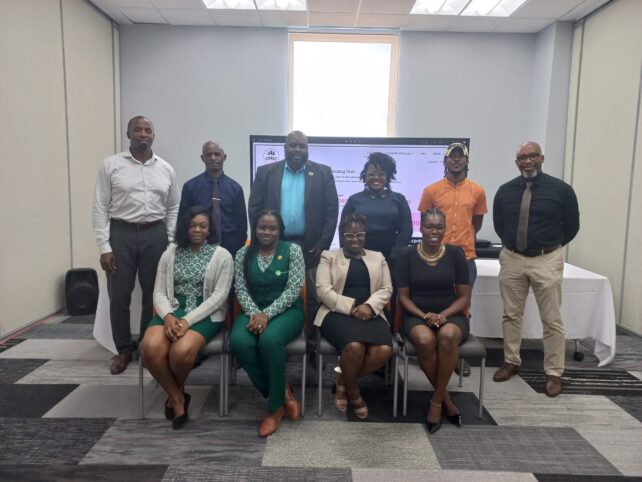
Speaking at a recent national debt consultation for civil society actors hosted by the Caribbean Policy Development Centre (CPDC) in Antigua, Former Debt Manager, in Antigua and Barbuda’s Ministry of Finance, Corporate Governance and Public Private Partnerships, Nadia Spencer-Henry, argued that civil society has an important role in assisting governments to manage debt obligations.
According to Mrs. Spencer-Henry, one effective way to exert this influence is to attend and actively participate in public consultations, thus helping to shape the design and implementation of government-funded projects and initiatives.
“Often, when we are doing a project, we have a lot of consultations. People hear that we are having a consultation and people think that it is for “somebody else” and not for them so they don’t need to really attend… And so, what we find is that the people who attend; the voices in the room, they are the ones that get heard. They are the people that will get the targeted assistance and the targeted support,” Spencer-Henry noted. The alternative, she explained, is to rely on external consultants, which may not find favour with stakeholders.
“When nobody shows up, we are left to depend on consultants who come in and do the assessment and a design. However, later on, you hear people on the radio complaining, but you weren’t there to consult and to advise and to give us your knowledge,” she said.
Mrs. Spencer-Henry also listed engaging in good procurement practices as an effective means of civil society keeping the government accountable where debt management is concerned since the group offers a lot of services to the government.
“A lot of people offer services to the Government and assume that they will be paid… However, you have to have a contract. Often, we have people showing up and producing a debt or an obligation to the Government to pay that is not properly contracted…Eventually, you may get paid because we try to do the paperwork on the back end, but ideally, that is not the way we would want to work,” she stated. Asking questions of government is also critical, Mrs Spencer Henry pointed out.
“So, you went to a consultation and the government promised you a project in an area… you need to ask questions if you see the project not being built as expected,” she said while reiterating that holding the government accountable starts with being involved at the consultation stage.
The Caribbean Policy Development Centre, in conjunction with its regional partners, is engaged in hosting a series of National Debt Consultations to build awareness of the developmental concerns surrounding debt in CARICOM states. Additionally, the consultations provide feedback on preferred policy recommendations for state policymakers. Thus far, consultations have been held in Antigua and Barbuda, Barbados, Grenada, Suriname, The Bahamas and Trinidad and Tobago.
Speaking on the issue, Development Specialist at CPDC, Geneva Oliverie, indicated that “wider civil society engagement with governments and input into policy is even more critical as the region faces numerous external shocks which have implications for its development trajectory. As reforms are sought at the global level in relation to how debt is administrated, regional governments will be required to adapt internal policies to meet the changing needs of their financial systems.”
The national debt consultation was held at Sir John E. St Luce Finance and Conference Center and saw the participation of several private sector groups and CSOs across Antigua and Barbuda. The Antigua and Barbuda consultation is part of a wider project being implemented by CPDC, with support from the Funders Organised for Rights in the Global Economy (FORGE) and in partnership with Debt Justice UK (formally Jubilee UK). The project seeks to build awareness of the impact of increasing debt in the Caribbean region by way of mobilising Caribbean CSOs and communities to have a more active role in public debt management.

In Dominica the Civil society has been infiltrated by operatives of the DLP. they have inserted themselves everywhere. You will get a false narrative and cover ups on government administration. Look now even Jr’s closing. the country not producing all money going out. They think tourism alone that can fix the country. nothing for manufacturing nothing for agro processing. If a call center come tomorrow and want a place to sit 500 people where are there going to put them ? as there is no space for businesses to grow. banks closed, utilities getting more expensive, cost of living going up quality of life going down. brain drain annually. Dominica boy, i swear you need a blue soap bath at the mouth of a river to take out that thing you have on you there.
The acceptable debt to GDP ratio is 60%. Dominica’s is well over 100%. This is like economic genocide. Incredibly, the media, business sector and the rest of civil society in Dominica should be raising alarm but are deafening silent.
Throughout the Caribbean region, the economies are being mismanaged. Most of their revenue is used to pay down the humongous debt they have racked up mostly due to corrupt practices. They hardly have money to improve healthcare, infrastructure, education and to give public servants livable salaries and wages.
No wonder these incompetent ‘leaders’ travel around the world on their knees with tin cup in hand begging for grants, donations and debt forgiveness.
The gargantuan debts that these inept, corrupt and uncaring maladministrations have stacked up, have put generations yet unborn, lives in serious jeopardy.